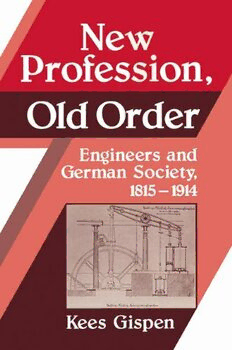
New Profession, Old Order: Engineers and German Society, 1815-1914 PDF
367 Pages·2002·7.571 MB·English
Most books are stored in the elastic cloud where traffic is expensive. For this reason, we have a limit on daily download.
Preview New Profession, Old Order: Engineers and German Society, 1815-1914
Description:
New Profession, Old Order is an exploration of the creative tension between modern technology and preindustrial Germany. It concentrates on the social and educational history of engineers as a microcosm of the larger society between 1815 and 1914, and asks why this new occupation, so successful in transforming the physical world, did not achieve the professional power, cohesion and prestige that its technological accomplishments would seem to have warranted. The author proposes answers that center on the historical situation in which the engineering profession found itself. He develops his thesis through careful consideration of the strategies, organization, and development of technical education in nineteenth-century Prussia, the educational struggles and political debates of German engineers and their various associations, changing career prospects, and the relations between engineering management, salaried employees, professionalizers, and government. The result is a study that demonstrates the seamless links between Germany's long-term socioeconomic modernization and its temporary political traumatization.
See more
The list of books you might like
Most books are stored in the elastic cloud where traffic is expensive. For this reason, we have a limit on daily download.
